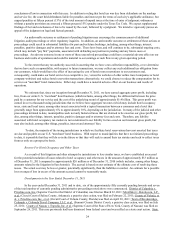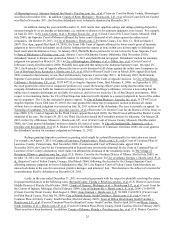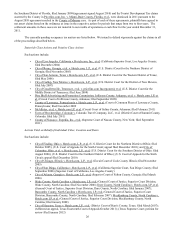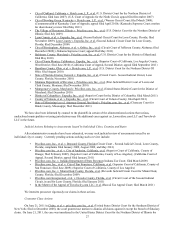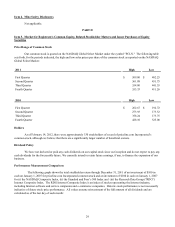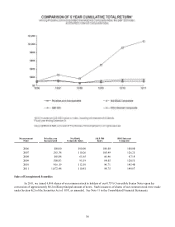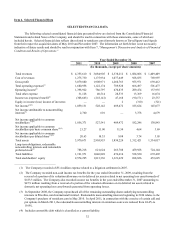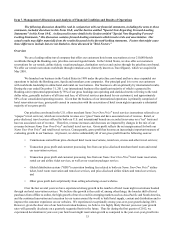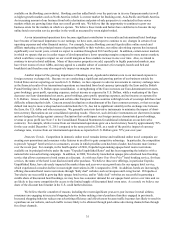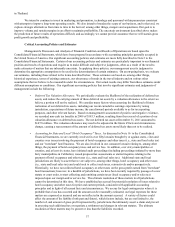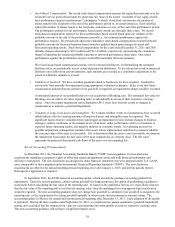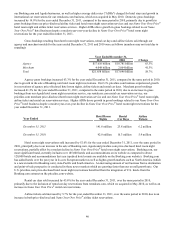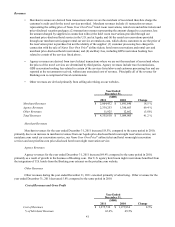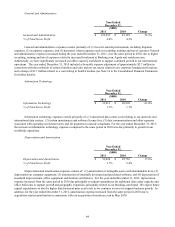Priceline 2011 Annual Report Download - page 35
Download and view the complete annual report
Please find page 35 of the 2011 Priceline annual report below. You can navigate through the pages in the report by either clicking on the pages listed below, or by using the keyword search tool below to find specific information within the annual report.34
in the fourth quarter of 2011. We expect to experience further deceleration in growth rates throughout 2012 and beyond.
In addition, many governments around the world, including the U.S. and certain European governments, are operating
at very large financial deficits. Governmental austerity measures aimed at reducing deficits could impair the economic
recovery and adversely affect travel demand. Weak economic growth and elevated unemployment rates in the economies of
such countries could cause, contribute to, or be indicative of, deteriorating macro-economic conditions. Recently, we have
experienced volatility in the growth rates for transactions booked and cancellations for our international business. We have also
observed a decline in transaction growth rates and weaker trends in hotel average daily rates ("ADRs") for certain southern
European countries, likely due to the impact of weak economic conditions and sovereign debt concerns. This volatility makes
it more difficult to predict longer-term trends and the future impact of macro-economic weakness on our business. Finally,
higher oil prices are contributing to higher airline ticket prices and are likely to adversely impact consumer discretionary funds
available to be spent on travel.
Large, established Internet search engines with substantial resources and expertise in developing online commerce and
facilitating Internet traffic are creating - and intend to further create - inroads into online travel, both in the U.S. and
internationally. For example, following its acquisition of ITA Software, Inc., a major flight information software company,
Google recently launched a new flight search tool that enables users to find fares, schedules and availability directly on Google
and excludes online travel agent ("OTA") participation within the search results. Google has also invested in HomeAway, a
publicly traded vacation home rental service, and launched "Hotel Finder," a utility that allows users to search and compare
hotel accommodations based on parameters set by the user. In addition, Microsoft has launched Bing Travel, which searches
for airfare and hotel reservations online and predicts the best time to purchase them. "Meta-search" sites leverage their search
technology to aggregate travel search results for the searcher's specific itinerary across supplier, travel agent and other websites
and, in many instances, compete directly with us for customers. Furthermore, certain suppliers limit OTA participation within
the meta-search results. Some meta-search sites, such as Kayak.com, which offers its users the ability to make hotel
reservations directly on its website, may evolve into more traditional online travel sites. These initiatives, among others,
illustrate a clear intention to more directly appeal to travel consumers by showing consumers more detailed travel search
results, including specific information for travelers' own itineraries, which could lead to suppliers or others gaining a larger
share of search traffic or may ultimately lead to search engines maintaining transactions within their own websites. If Google,
as the single largest search engine in the world, or Bing, or other leading search engines refer significant traffic to these or other
travel services that they develop in the future, it could result in, among other things, more competition from supplier websites
and higher customer acquisition costs for third-party sites such as ours and could have a material adverse effect on our
business, results of operations and financial condition.
Several major hotel companies, including Choice Hotels International, Hilton Worldwide, Hyatt, InterContinental
Hotels Group, Wyndham Hotel Group and Marriott, have launched Room Key, a hotel search engine that competes directly
with our hotel room night reservations services around the world. The hotel companies that own Room Key have a stated goal
of driving demand directly to their brand web sites, thus reducing the share received by online travel agencies. They may also
attempt to improve their competitive position by offering lower room rates, better room availability or additional features or
amenities through Room Key than are available through services like ours. If Room Key is successful, our share of the online
hotel room night reservation market could be negatively affected in the United States and around the world and our business
could suffer.
Hotels also are increasingly offering hotel room reservations through "daily deal" websites such as Groupon and
Living Social, which sell coupons to customers at a substantial discount. Expedia recently entered into a partnership with
Groupon to sell hotel room reservations to Groupon customers under the "Groupon Getaways" brand name. If these new
services are successful, we may experience less demand for our services and are likely to face more competition for access to
the limited supply of discounted hotel room rates.
International Trends. The size of the travel market outside of the United States is substantially greater than that within
the United States. Historically, Internet adoption rates and e-commerce adoption rates of international consumers have trailed
those of the United States. However, international consumers are rapidly moving to online means for purchasing travel.
Accordingly, recent international online travel growth rates have substantially exceeded, and are expected to continue to
exceed, the growth rates within the United States. We expect that over the long-term, international online travel growth rates
will follow a similar trend to that experienced in the United States. In addition, the base of hotel suppliers in Europe and Asia
is particularly fragmented compared to that in the United States, where the hotel market is dominated by large hotel chains. We
believe online reservation systems like ours may be more appealing to small chains and independent hotels more commonly
found outside of the United States. Our growth has primarily been generated by our international hotel reservation service
brands, Booking.com and Agoda. Booking.com, our most significant brand, currently includes over 185,000 hotels and
accommodations on its website as compared to about 120,000 hotels and accommodations last year (updated hotel counts are


